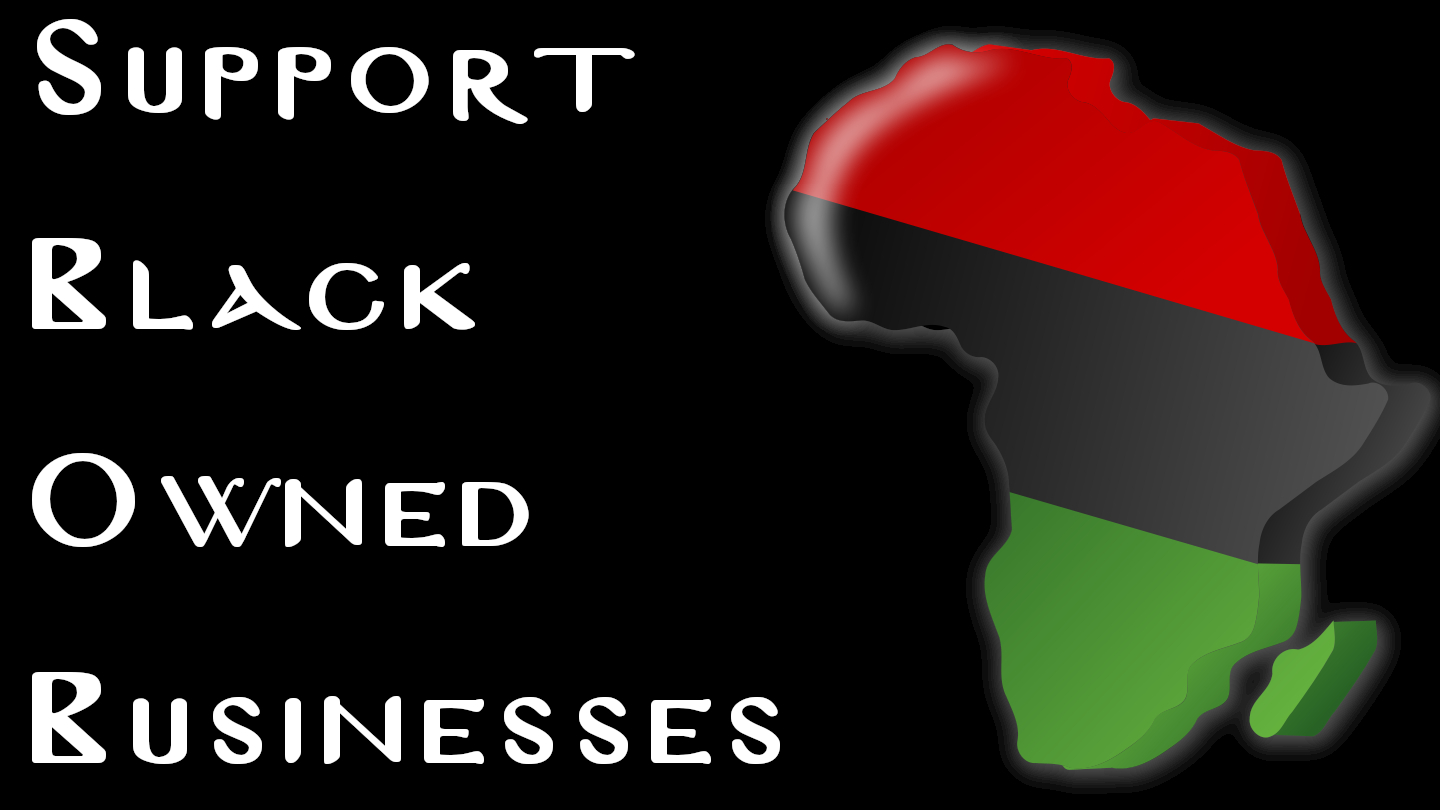Why Support Black Owned Businesses

I released my first blog about black-owned businesses in early 2021. Since then, I've written multiple posts about Black culture including one specifically about digital marketing tips for Black business owners.
This opinion piece is in response to my anticipating hearing this question more often as I create such content.
Why Do I Support Black Owned Businesses?
Let me start with summaries of some remarks I've read from a particular forum regarding support for Black-owned businesses.
"Defining something as 'black-owned' is racist."
"If you want to end racism, stop talking about it."
"The term 'black-owned business' sounds like Blacks need help."
"Race is not that big an issue."
"It shouldn't matter who owns the business."
"I'd rather see 'America-owned' or 'Veteran-owned' instead."
Notice how the quotes start with a combative dismissal, wrestle with arguments to downplay racism, and end with substituting it for a broad, inclusive, category that includes Caucasians. Now, read the next paragraph carefully.
What you do with your money is your business. I'm only targeting Blacks in this post. If you're not Black, even by the one percent rule, I'm not talking to you right now. Read on if you want to understand a different perspective on the matter, though. If you think proactively purchasing products and services from Black-owned companies is racist, or disagree with anything else I've said here, read my essay-length rant on racism against Blacks.
How do Brands You Support Use Your Money?
If you're black, I believe what you do with your money matters a lot to the Black/African-American/ADOS, etc. community. I've had more than a full serving of the "B1" (Black first) mindset and believe PowerNomics to be the way, all the way.
One of the biggest questions you should ask about your favorite products is whether they support the same causes as you. You vote with your dollar. Does your preferred brand financially support (directly or indirectly through politicians and other organizations):
- Removal of firearms from US citizens
- Banning abortion (e.g. birth dearth)
- Gentrifying Black neighborhoods (sometimes after bombing them
- Monopolies to drive up pricing of services
- Restricting freedom of speech
- Chemicals that make the nation fatter and less healthy
- Black feminization
Even in my youth, I cared when I heard the since debunked rumor that Tommy Hilfiger hated minorities. I wanted to buy FUBU shoes (For Us By Us) when I learned they were Black-owned, but I didn't like the shoes. Remember, showing a brand means freely advertising for it. That is support.
That's just a few trigger points that came to mind. There's a certain point where you learn enough about politics (politricks) to understand how much a company's bottom line affects decisions, for better and worse. Yvette Carnell of the ADOS Foundation once talked about how great it would be if we knew as much about our local politicians as our favorite sports teams. That's another topic but you get the point. We collectively need to care more about laws governing our community and what influences them.
When I buy from Black-operated businesses, I at least know it is going towards:
- A company likely doing other deeds to support Black families
- Showing Black youth that we can be more than street cats, leading by example
- A small business which challenges monopolies for customers in a way they can't simply match (being Black-owned)
- An organization that better understands my needs and culture on a deeper level
"Black-owned" Empowers Blacks
Black youth needs to see more than music artists boasting about money, sex, drugs, and other unfulfilling entertainment. Legendary rapper KRS-One, short for "Knowledge Reigns Supreme Over Nearly Everyone," dropped two conscious hip-hop albums, and I found out on accident. I have to check for Nas releases because he doesn't get a push anymore. But we got plenty female stripper club music rappers and gay rappers focusing more on negative theatrics than lyricism.
The idea of "Black-owned" being racist is almost laughable. I don't hear "woman-owned" companies being called sexist. I've never heard push-back against "minority-owned," or "Asian family-owned." I don't recall hearing crap about Veteran-owned companies. Corporations marketed as diverse, inclusive, "pro-military Veteran," or "pro-LGBTQ+" don't get backlash, at least until insiders prove otherwise. I know many gun free zones (excluding federal establishments), but many were justified.
It is easy to say racism isn't a big issue when you don't experience it outside of simulations and inconsequential get-togethers with no large-scale effect. Nevermind the fact that the term "racist" generally implies using power with prejudice to suppress an ethnic group, not uplift and motivate them. I'm sure there are individuals who would refuse to support a business just because the owner is Black. Surely there were people who didn't vote for Barack Obama for that same reason. Remember, Steve Harvey's Obama stand-up bit? There's an argument for that being racist on a white person's part, but I digress.
I get it. Many simply want the topic of racism to go away so you can continue living in ignorance about how much we were wrongly taught during grade school and some college sessions. You don't want to reflect on and challenge things you were taught to simply accept as fact so that you can truly grow.
Some think that Blacks discussing discrimination indicates a victim mentality. There is some of that, no doubt. I know Blacks that will say Whites are the root of all evil, and there's no point of trying to fight it. This ain't that. This has goals, and you reading this counts as progress.
I think my racism post has enough to explain why not talking about racism is a stupid solution. It's easier to say you don't care about lies that support racism against Blacks. You simply can't resolve an issue without truly understanding the "why" and "how" of it. That means shuffling through questions like:
- What did Africans believe in before being American slaves? Ma'at? Whatever it is, why is it never mentioned?
- How many gun control methods are "black codes" to keep firearms out of Blacks' hands?
- Why are the child support and criminal court systems so discriminatory against Blacks?
- How is marijuana conviction forgiveness being handled?
- Why do we always hear about Martin Luther King Jr's "I Have a Dream" speech but not his fight for reparations?
Next.
I'm Black Before I'm Gay
It is self-explanatory but not a point of view everyone considers. Face to face, everyone notices my dark skin and big facial features. Some might guess that I'm ex-military. But few look at me and think "he's definitely 'fruits in the boots'" at first glance. I don't set off people's "gay-dar." White supremacists realize they're looking at someone they hate. Homophobic folks do not.
The Black community is where my legacy will rest, not the gay community. My Black roots will remain, no matter the ethnicity of my wife and child ("divesting" requires its own post). Gay tendencies of my child can wither with good parenting.
How to Help Black-owned Businesses
Yes, Blacks do need help. We need to help ourselves, of course. But we also need the US government to distribute today's equivalent of 40 acres and a mule like they did them COVID relief checks in 2021.
A few years ago, I wrote about how to support independent musicians. The points are valid for Black-owned shops as well:
- Purchase their services and products
- Share them with others who might be interested in them via social media and word of mouth
- If they're local, or you know the CEO personally, ask them
Why Not Support Black-owned Businesses
A few reasons I can imagine for not supporting Black-owned businesses:
- You focus more on local businesses that don't require online shopping
- Trying something new doesn't interest you
- You prefer to use what you've seen everyone else using
- Businesses owned by other groups interest you more
- You haven't found one with greater value compared to what you're already using
- You're a white supremacist, and that's not cool
There are few true advocates for equality like John Brown or Viola Liuzzo.
Thanks for reading.
Tags: black-community





